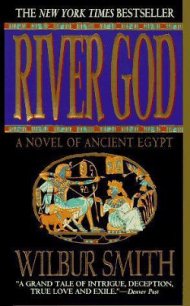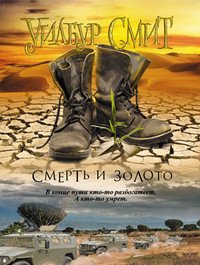Men of Men - Smith Wilbur (онлайн книга без txt) 📗
It had hung limply in the stupefying heat all that morning, but now as the patrol rode in across the open ground above the river bank, it unfurled briefly on a random current of air, snapped as though to draw attention to itself, and then extended its full glory for a moment, before sagging wearily once again.
At the head of the patrol, Ralph Ballantyne turned to his father who rode at his side. "That flag makes no bones about it, Papa."
The pretty crosses of Sint George, Sint Andrew and Sint Patrick that made up the Union Jack, had the Company insignia superimposed upon them, the lion gardant with a tusk of ivory held in its claw and the letters under it T.S.A.C.I, British South Africa Company.
"Servants of the Company first, and of the queen a good deal later."
"You're a cynical rascal, Ralph." Zouga could hardly suppress his smile. "Are you suggesting that there is a man in all our Company here for personal gain rather than glory of Empire?"
"Perish the thought." This time Ralph chuckled. "By the way, Papa, how many land grants have you bought up so far? I am losing count, is it thirty or thirty-five?"
"This is a dream I worked for all my life, Ralph. It's coming true before our eyes, and when it does, I'll have c my fair reward, and nothing more."
The laager was drawn up in its rigid square three hundred yards from the steep banks of the Shangani river, in the centre of a dried-out clay pan. The surface was as flat and bare as a tennis court. The clay had cracked into irregular briquettes that curled up at the edges. They crunched under the horses" hooves as Zouga led the patrol in.
They had been out for two days, scouting the road beyond the river, and Zouga was pleased to see that during his absence Sint John had taken Zouga's advice and had his axemen hack down the brush around the edges of the pan to open the field of fire. Now any attacker have to cross three hundred yards of bare clay to reach the square of wagons, all of it under the evil little Cyclopean scrutiny of the Maxims.
As they cantered up, a party unchained the wheels of one of the wagons and dragged it aside to allow them to enter, and a sergeant in Company uniform saluted Zouga as he passed and called after him.
"General Sint John's compliments, sir, and will you report to him directly."
"My bet is that you need a drink." Mungo Sint John took one look at the dust that clung like flour in Zouga's beard and the dark patches of sweat that had soaked through his shirt. Coldly Zouga nodded his thanks and poured from the bottle that held down one corner of the map.
"The impis are out in full array," he said, and let the whisky soak the cloying dust from the back of his throat before going on. "I have identified most of them. There's Gandang's Inyati, and Manonda's Insukamini -" He reeled off the names of the indunas and their impis, glancing at the notes he had made on his pad. "We had a brush with the "Moles" and had to shoot our way out and ride for it, but still we reached the Bembesi river before turning back."
"Where are the impis, Ballantyne? Damn it, man, we have advanced seventy miles from Iron Mine Hill and seen neither hide nor hair of them," Jameson demanded almost petulantly.
"They are all around us, Doctor. A thousand or more in the trees just across the river, and I cut tracks that showed that two more impis have circled out behind us.
They are probably lying across the Longiwe Hills watching every move we make., "We must bring them to battle," Jameson fretted. "Every day the campaign lasts is costing the shareholders money."
"They won't attack us here, not while we are in laager, not across open ground."
"Where then?"
"They will attack in the Zulu way, in broken ground, or thick bush. I have marked four likely deffles ahead of us, places where they will be able to creep up close on either side or lay to ambush the wagons as we pass."
"You want us to walk into their trap, rather than draw them out?"
Mungo asked.
"You'll not draw them out. I think their commander here is Gandang, the king's half-brother. He is far too cunning to come at us in the open. If you want to fight them, it must be in the bad ground."
"When the serpent is coiled, with his head drawn back and his mouth agape to show the venom hanging like drops of dew upon his fangs, then the wise man does not stretch out his hands towards him." Gandang spoke softly, and the other indunas cocked their heads to listen to his words. "The wise man waits until the serpent uncoils and begins to creep away, then he steps upon the head and crushes it. We must wait. We must wait to take them in the forests, when the wagons are strung out, and the outriders cannot see one another. Then we cut the column into pieces and swallow each one, a mouthful at a time."
"Yet my young men are tired of waiting," said Manonda, facing Gandang across the fire. Manonda was the commander of the elite Insukamini impi, and though there was silver on his head, there was still fire in his heart. They all knew him to be brave to the edge of folly, quick to take an insult, and quicker still to revenge it.
"These white barbarians have marched unopposed across our lands, while we trail around them like timid girls guarding our maidenheads and giggling behind our hands. My young men grow weary of waiting, Gandang, and I with them."
"There is a time for timidity, Manonda, my cousin, and there is a time to be brave."
"The time to be brave is when your enemy stands brazenly before you. They are six hundred, you have counted them yourself, Gandang, and we are six thousand."
Manonda grinned mockingly around the circle of listening men. On the brow of each was the headring of high office, and on their arms and legs the tassels of courage.
"Shame on those that hesitate," said Manonda, the Bold.
"Shame on you, Bazo. Shame on you, Ntabene. Shame on you, Gainbo." His voice was filled with scorn, and as he said each of their names they hissed with angry denial.
Then suddenly here was a sound from beyond the circle of squatting indunas, a sound in the night that chilled and silenced them all. It was the eerie wail of mourning for the dead, and as they listened it came closer, and with it were many other voices.
Gandang sprang to his feet and challenged loudly.
"Who comes?"
And out of the darkness a dozen guards, half dragged and half carried an old woman. She wore only a skirt of untanned hyena skin, and around her neck the grisly accoutrements and trappings of the witch's trade. Her eyes were rolled up into her head so that the whites flashed in the firelight, and her spittle foamed on her slack lips. From her throat issued the wails of mourning for the dead.
"What is it, witch?" Gandang demanded, his superstitious fears twisting his mouth and darkening his eyes.
"What tidings do you bring?"
"The white men have desecrated the holy places. They have destroyed the chosen one of the spirits. They have slaughtered the priests of the nation. They have entered the cave of the Umlimo in the sacred hills, and her blood is splashed upon the ancient rocks. Woe unto all of us. Woe unto those who do not seek revenge. Kill the white men. Kill them all!" The witch threw off the restraining hands of the guard and, with a wild shriek, hurled herself into the midst of the leaping flames of the watch-fire.
Her skirt burst into flames. Her wild bush of hair burned like a torch. They drew back in horror.
"Kill the white men," screamed the witch from out of the flames, and they stared as her skin blackened and her flesh peeled from off her bones. She collapsed and a torrent of sparks flew up into the overhanging branches of the forest, and then there was only the crackle and drum of the fire.




